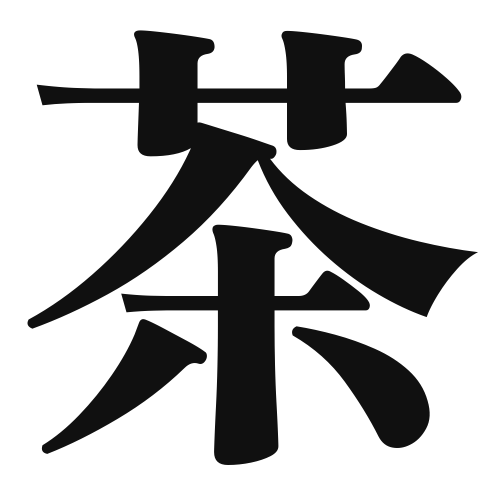1. Overview of Meaning
The kanji “茶” (pronounced “cha” in Japanese) means “tea.” It refers to the beverage made from the leaves of the Camellia sinensis plant, which is enjoyed worldwide in various forms.
2. Formation and Radicals
Formation of the Kanji: The kanji “茶” is a compound character, which means it is formed by combining different elements. It is classified as a phonetic-ideographic character, where the left part represents the meaning related to plants, and the right part indicates the pronunciation.
Radical: The radical for “茶” is “艹” (the grass radical), which is commonly associated with plants and vegetation.
3. Examples of Usage
Common Words and Phrases: Some frequently used words that include “茶” are:
- 緑茶 (ryokucha) – green tea
- 紅茶 (kōcha) – black tea
- お茶 (ocha) – tea (polite form)
Example Sentences in Daily Conversation:
- 「お茶を飲みますか?」 (Ocha o nomimasu ka?) – “Would you like to drink some tea?”
- 「私は緑茶が好きです。」 (Watashi wa ryokucha ga suki desu.) – “I like green tea.”
4. Synonyms and Antonyms
Similar Kanji: A similar kanji is “酒” (sake), which means “alcohol.” While both are beverages, “茶” specifically refers to tea, whereas “酒” refers to alcoholic drinks.
Antonyms: There are no direct antonyms for “茶,” but one could consider “水” (mizu), meaning “water,” as a contrasting beverage that is non-caffeinated and non-alcoholic.
5. Cultural and Historical Background
Relation to Japanese Culture: Tea has a significant place in Japanese culture, symbolizing hospitality and tradition. The Japanese tea ceremony, known as “茶道” (sadō), emphasizes aesthetics, mindfulness, and respect.
Proverbs and Idioms: One common saying is “茶の湯” (chanoyu), which refers to the tea ceremony, highlighting the importance of tea in social and cultural contexts.
